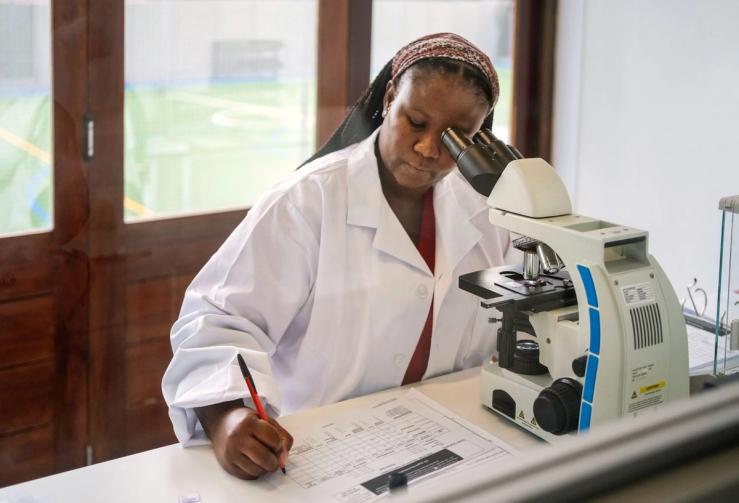The Scoop
KIGALI, Rwanda — South African biotech company Afrigen is collaborating with a Nobel Prize-winning scientist to develop groundbreaking gene therapy treatments that target diseases that have plagued Africa for decades.
The Cape Town-based company is working with the University of Pennsylvania’s Drew Weissman, who won a Nobel Prize for developing mRNA vaccines used to fight COVID-19.
“My people are in his labs working with some of his top scientists on mRNA. And, of course, we are extremely interested to further collaborate,” Afrigen CEO Petro Terblanche told Semafor Africa. She said the company is exploring “opportunities to bring gene therapy to Africa” through its ties with scientists at University of Pennsylvania.
Gene therapy refers to forms of treatment that add a new gene or repair a mutated one inside the human body.
Treatments for sickle cell disease, a condition that mostly afflicts people of African descent, have been approved by US authorities in recent months. Gene therapy treatments are also being developed to treat blindness and deafness.
Know More
Afrigen’s model involves developing the technology and expertise to create vaccines and therapeutic drugs which it then shares with partner manufacturers. It has a mandate to share technology and expertise with vaccine producers and research institutions under an initiative backed by the World Health Organization.
Terblanche, speaking to Semafor Africa on the sidelines of the Africa CEO Forum in Kigali, said the company shared information with 15 partners — made up of vaccine manufacturers and research institutions — in South Africa, Senegal, Nigeria, Kenya, Tunisia, and Egypt.
She said Afrigen is developing a new generation of mRNA vaccines for a range of diseases including HIV, tuberculosis (TB), Rift Valley fever, and gonorrhea.
Afrigen needs “a pipeline of products” that can be produced on an mRNA platform, Terblanche told Semafor Africa. “As we move these through the pipeline we will continue to focus on diseases which are a priority for the region,” she said.
Vaccines based on messenger ribonucleic acid (mRNA) technology train the immune system to recognize and fight threats. Weissman, whose laboratory is developing gene therapy for sickle cell disease, has previously spoken of the potential to harness mRNA technology to produce relatively cheap vaccines and therapeutic treatments that can be rolled out in low and middle income countries.
Alexis’s view
The COVID-19 pandemic taught us so much. The early scramble for vaccines was a stark glimpse of global power dynamics, as wealthy nations secured access to the first shots when the world teetered on the brink of uncertainty. But the pandemic also spurred incredible innovation.
The takeaway from both lessons was the same: African countries need to manufacture more vaccines and drugs locally. That’s why the African Union has set a target of 60% of vaccines, therapeutics, and other medical products being manufactured locally by 2040. And international vaccine group Gavi in December approved a financing instrument that will make up to $1 billion available to support vaccine manufacturing in Africa.
In mRNA technology, the continent has an opportunity to harness an innovative form of treatment that, with time and investment, has the potential to lower the cost of healthcare. That’s because these treatments could offer protection against a broad range of diseases that have previously been ignored. Many conditions, from sickle cell to malaria and HIV, could one day be treated with as little as a single injection.
Obviously, this is important on a human level because of the physical and mental anguish illnesses can cause for sufferers and their loved ones. We often talk about Africa’s relative youth, compared to other parts of the world. But it’s also important to ensure that future generations are healthy.
But none of this will be easy. The collaborations involving Afrigen are just the start of a process that could take years and would need the backing of governments and global health bodies. The potential impact can be realized, but African countries need to build their biotech sectors to make it happen.
Room for Disagreement
At present, mRNA vaccines typically must be stored at very cold temperatures of minus 20 C to minus 80 C (minus 4 F to minus 112 F), which drives up the cost. The temperature requirements have been a barrier to entry in poorer countries which lack such refrigeration facilities.
Terblanche said Afrigen and its partners had developed processes to ensure thermostability of products between 2 C and 8 C (35.6 F and 46.4 F). “We’re working with partners to innovate around the current mRNA vaccine because that also reduces the cost,” she said.
The View From Central African Republic
Forms of gene therapy “could revolutionize medical care in Africa” by enabling patients to receive cures “in countries that still need time to develop comprehensive healthcare systems, said Yap Boum II, executive director of the Institut Pasteur de Bangui.
He said investment in training programs to develop local expertise in mRNA technology would be “essential” for it to be taken up, adding that “harmonizing and simplifying regulatory frameworks across the continent” would expedite the approval and implementation of new technologies.
Boum told Semafor Africa the widespread deployment of techniques like mRNA technology “will take years” because it would only follow the building of human capacity and the sharing of technology, which would require investment.
Notable
- Moderna last month said it had put on hold plans to build a mRNA vaccine manufacturing plant in Kenya. The Africa Centres for Disease Control and Prevention accused the US biotech company of “abandoning” its commitment to vaccine equity.


